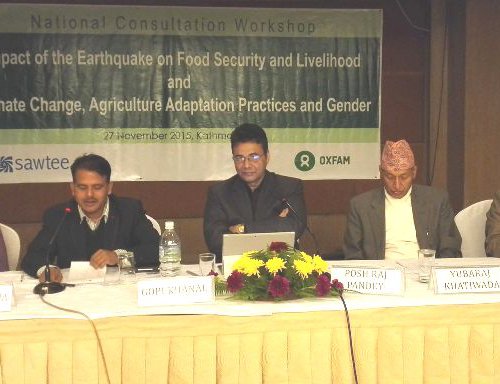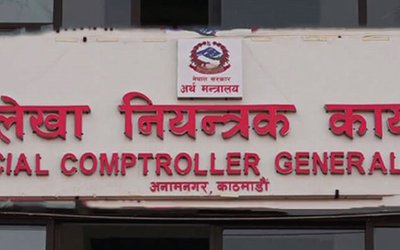
Leading experts, policymakers and scholars from the energy, forestry and tourism sectors—all three important to Nepal from the perspective of low carbon competitiveness perspective—discussed and explored ways to low carbon growth vis-a-vis these three sectors in Nepal.
The discussion took place during the dissemination workshop that has been organised to validate the research report titled “Practical Approaches to Supporting Competitiveness of Lower/Middle Income Countries in a Carbon Constrained World: A Case Study of Nepal in the Context of Climate Change Mitigation” conducted by South Asia Watch on Trade, Economics and Environment (SAWTEE) in collaboration with the Overseas Development Institute (ODI), the United Kingdom. The goal of the study is to promote better economic policymaking that responds to the new opportunities and threats that will arise in a low-carbon global economy along with the promotion of green growth and jobs.
According to Dr Ratnakar Adhikari, Chief Executive Director, SAWTEE: “The impact of climate change, including the global call for ratcheting up mitigation efforts and various ramifications at the national level are likely to alter the dyanmics of competitiveness in most low income countries and Nepal is not an execption to this.” Since report to be presented today focuses on Nepal’s case study, the objective of the event is to discuss the impact on Nepal’s competitiveness and growth as well as to identify potential opportunities and threats, he remarked.
Karen Ellis, Head of Programme, Private Sector and Markets, ODI, UK while presenting the conceptual framework of the study said that the climate change, international mitigation policies, and natural resource scarcity will create opportunities and threats for Nepal’s competitiveness and sources of growth. According to her, now is the time for policymakers and businesses to act in order to manage risks and capitalize on the opportunities. Alberto Lemma, Research Officer, Private Sector and Markets, ODI, UK stated that growth and low carbon emissions can work together in order to let Nepal gain a competitive edge against high income countries which will struggle to move away from high carbon processes, an issue that Nepal does not have to face since it can choose, now, to move towards green productive sectors.
Amid the very slow progress towards developing carbon finance through REDD+ at the international level, it is not clear how or how quickly the mechanism will develop going forward, according to Asish Subedi, Programme Officer, SAWTEE. Thus while positioning the country to benefit from REDD+ makes sense, too much reliance should not be placed on this as a funding mechanism. Rather, he suggested, public sources of climate finance are perhaps more likely to be forthcoming for low income countries such as Nepal.
“The report has identified the ways towards low carbon growth in Nepal as well has highlighted the opportunities and challenges in the tourism, forestry and energy sectors. Any measures taken to decrease green house gas emission should not hamper our growth prospects, and our possibility to catch up with the developed world”, said Dr Posh Raj Pandey, Executive Chairman, SAWTEE, who was Charing the session during which three different presentations were made relating to three different sectors, namely tourism, forestry and energy. He also suggested that the low-carbon growth trajectory has to be a long term and a hollistic approach. Altogether about 40 stakeholders participated in the workshop.
- TANAHU HYDROPOWER PROEJCT: A Significant Achievement
- Apr 15, 2024
- AMBASSADOR HANAN GODAR: Sharing Pain With A Nepali Family
- Mar 30, 2024
- VISIT OF KfW AND EIB TO NEPAL : Mission Matters
- Mar 25, 2024
- NEPAL BRITAIN SOCIETY: Pratima Pande's Leadership
- Mar 24, 2024
- NEPAL ARMY DAY: Time To Recall Glory
- Mar 15, 2024
















